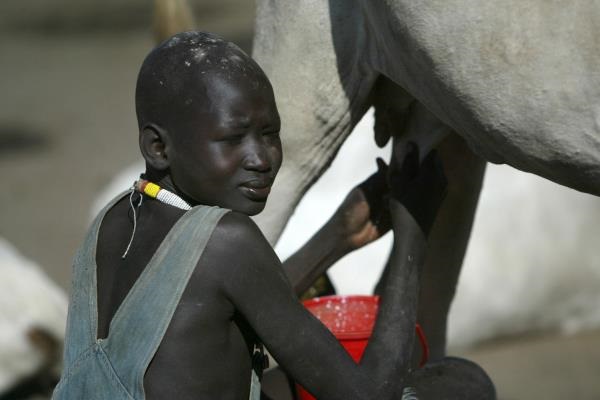South Sudan facing major food and nutrition crisis
5 February 2014, Rome – FAO today warned of a major food security and nutrition crisis in South Sudan, where some 3.7 million people are now facing acute or emergency levels of food insecurity.
The Organization is calling for $77 million for critical food security and livelihood support for the crisis-affected population as prices of staple crops soar and basic commodities run out.
UN agencies and NGOs have revised a Crisis Response Plan and are now seeking a total of $1.27 billion to meet urgent humanitarian needs in the first half of 2014.
Up to seven million people are at risk of some level of food insecurity in the world’s newest nation.
“South Sudan was already the scene of one of the world’s largest humanitarian operations before the fighting began, and the situation is now deteriorating rapidly,” said Sue Lautze, FAO Head of Office in South Sudan.
“Markets have collapsed, infrastructure is damaged, foreign traders have fled, commodity supply corridors have been disrupted by violence, and rural populations are unable to bring their crops, livestock and fish to market for sale.”
Agricultural cycle disrupted
Over 870 000 South Sudanese have fled their homes in the last six weeks after fighting broke out in Juba in December and spread across the eastern and central parts of the country.
Displacement has severely disrupted the agricultural cycle and the prevailing situation of severe food insecurity will be further exacerbated if farmers miss the main planting season that begins in March.
“Missing the main planting season will have serious knock-on effects on food production and availability in the country in 2014 and on into 2015,” said Dominique Burgeon, Director of FAO’s Emergency and Rehabilitation Division, who recently visited South Sudan. “At the moment supply corridors have been disrupted or completely shut down in many areas of the country, and farmers need urgent assistance to access vital agricultural inputs in time.”
Livestock production is threatened by potential animal disease outbreaks such as East Coast fever and peste des petits ruminants as unvaccinated herds mingle with vaccinated livestock. This situation is worsened by the partial collapse of the cold chain for vaccine storage due to looting and ongoing violence.
There are further concerns that many displaced people who have sought shelter along rivers will need to move again due to flood waters as the rainy season approaches, further undermining their food security and recovery of livelihoods.
“Continued violence is obviously hampering the humanitarian response, but FAO will work with local partners on the ground to get vital supplies to vulnerable livestock owners, fishers, farmers and urban populations in the country,” Lautze said.
FAO response plan
FAO plans to assist a total of 545 000 households, by providing rapid emergency livelihood support in the most affected states in South Sudan while protecting food production in the less-affected areas.
Four different emergency livelihood kits will be distributed: food crop seeds and basic tools, nutrient-dense vegetable seeds and basic tools, fishing kits, and community animal health worker kits.
FAO will help vulnerable urban populations by promoting the use of nutrition vouchers to link them with milk, vegetable and fish producers, and providing support so that they can grow vegetables in any small plots of land available in towns and cities.
In more stable regions, FAO plans to work with partners and the government to ensure quality seed for key food crops such as cereals, legumes, roots and tubers as well as vegetables is available at local level.
To prevent the spread of livestock disease, FAO will equip and train community animal health workers to provide basic animal health support during migrations and help restore the cold chain for vaccine storage and distribution.
Finally, FAO plans to minimize the environmental impact of improvised settlements, for example by introducing fuel-efficient stoves to reduce the use of firewood and charcoal.
To date, FAO has received $4.25 million of the $77 million needed to implement the emergency response plan.
As co-leads of the Food Security and Livelihood Cluster, FAO and the World Food Programme will continue to support the coordination of partners within and beyond the United Nations.
